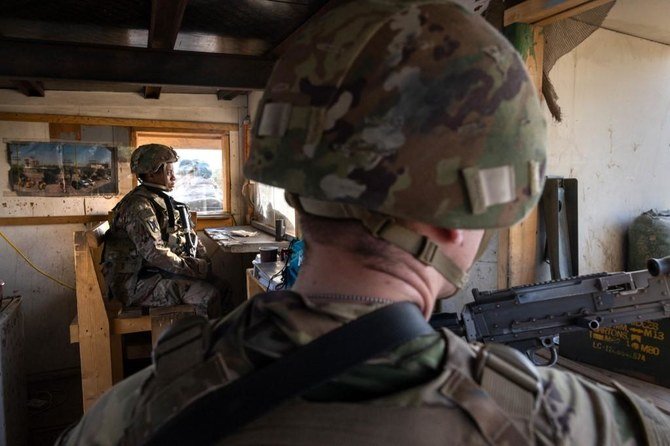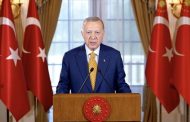President Joe Biden and Iraqi Prime Minister Mustafa al-Kadhimi are expected to announce that they have reached an agreement to end the US military’s combat mission in Iraq by the end of the year, according to a senior Biden administration official.
Kyiv. Ukraine. Ukraine Gate – July 27, 2021 – Diplomatic Affairs
The plan to transform the US military mission, the whose stated goal is to help Iraq defeat ISIS, into a rigorous advisory and training role by the end of the year – with no US forces in a combat role – will be outlined in a broader statement to be issued by the two leaders after their meeting at the White House. On Monday afternoon, the official, who spoke on condition of anonymity to discuss the yet-to-be-announced plan, said.
The official said the Iraqi security forces had “gone the test of battle” and proved they were “capable” of protecting their country. However, the official said, the Biden administration understands that ISIS remains a significant threat.
In fact, the terrorist organization ISIS is a shell of its own since it was largely directed on the battlefield in 2017. However, it has shown that it can still carry out attacks with great losses. Last week, the group claimed responsibility for a roadside bomb attack that killed at least 30 people and wounded dozens in a crowded market on the outskirts of Baghdad.
The United States and Iraq agreed in April that the United States’ transition to a training and advisory mission would mean that the United States combat role would end, but they did not come up with a timeline for completing that transition. The announcement comes less than three months before the parliamentary elections scheduled for October 10.
Al-Kazemi does not face any shortage of problems. Iran-backed militias operating inside Iraq have intensified their attacks against US forces in recent months, and a series of devastating hospital fires that have left dozens dead and a high number of coronavirus infections added new layers of frustration to the nation.
For Al-Kadhimi, the ability to offer the Iraqi public a date to end the US combat presence may be a feather in his hat before the elections.
Biden administration officials say Kadhimi also deserves credit for improving Iraq’s standing in the Middle East.
Last month, Jordan’s King Abdullah II and Egyptian President Abdel Fattah al-Sisi visited Baghdad for joint meetings — the first time an Egyptian president has paid an official visit since the 1990s when ties were severed after Saddam Hussein’s invasion of Kuwait.
And in March, Pope Francis made a historic visit to Iraq, where he prayed among the destroyed churches in Mosul, the former ISIS stronghold, and met influential Shiite cleric Grand Ayatollah Ali al-Sistani in the holy city of Najaf.
It was widely expected that the US and Iraq would use the face-to-face meeting to announce plans to end the combat mission, and Al-Kadhimi made it clear before his trip to Washington that he believed it was time for the US to calm down. combat mission.
“There is no need for any foreign combat forces on Iraqi soil,” Al-Kadhimi said.
The US troop presence has reached about 2,500 since late last year when former President Donald Trump ordered a troop reduction from 3,000.
The announcement of the end of the US combat mission in Iraq comes as the United States is in the final stages of ending its war in Afghanistan, nearly 20 years after President George W. Bush launched the war in response to the September 11, 2001 attacks on Afghanistan. United State.
The origins of the mission to train and advise Iraqi forces more recently can be traced back to former President Barack Obama’s 2014 decision to return troops to Iraq. The move came in response to the ISIS takeover of large parts of western and northern Iraq and the collapse of the Iraqi security forces, which seemed to threaten Baghdad. Obama completely withdrew US forces from Iraq in 2011, eight years after the US invasion.
The distinction between combat forces and those involved in training and advising can be blurry, given that US forces are under attack. But it is clear that US ground forces have not been on the offensive in Iraq in years, except for largely undeclared special operations missions targeting ISIS fighters.
Pentagon officials have tried for years to balance what they see as a necessary military presence to support the Iraqi government’s fight against ISIS with domestic political sensitivities in Iraq to the presence of foreign forces. A major complication for both sides is periodic attacks on bases housing US and coalition forces by Iraqi militia groups allied with Iran.
The weakness of US forces was most evident in January 2020 when Iran launched a ballistic missile attack on Al Asad Air Base in western Iraq. None of the Americans were killed, but dozens sustained brain injuries from the blasts. That attack came shortly after the Iranian military commander Qassem Soleimani and prominent Iraqi militia leader Abu Mahdi Al-Muhandis were killed at Baghdad International Airport by a US drone strike.
The US military mission since 2014 has focused largely on training and advising Iraqi forces. In April, in a joint statement following a US-Iraqi meeting in Washington, they announced that “the mission of US and coalitions has now shifted to a mission focused on training and advisory missions, allowing for the redeployment of any remaining combat forces from Iraq” at a time to be determined.
Monday’s statement is also expected to detail US efforts to help the Iraqi government address COVID-19, the education system, and the energy sector.
Read Also: ISIS Militants Abducted and Killed a Father and Son in Iraq
Source: Ukrgate







